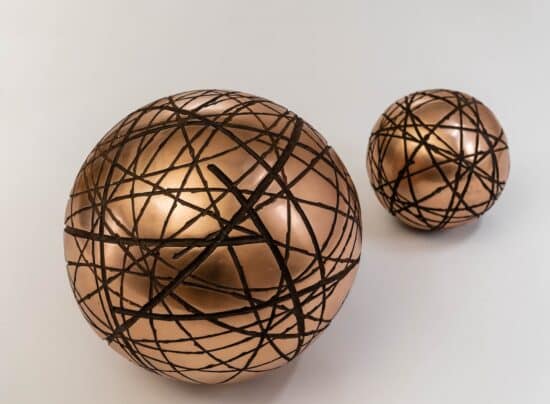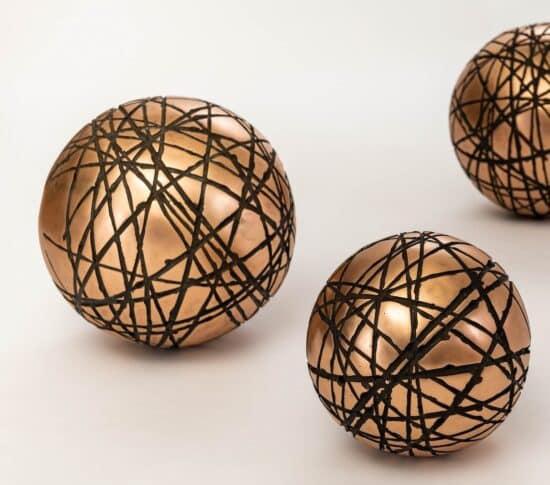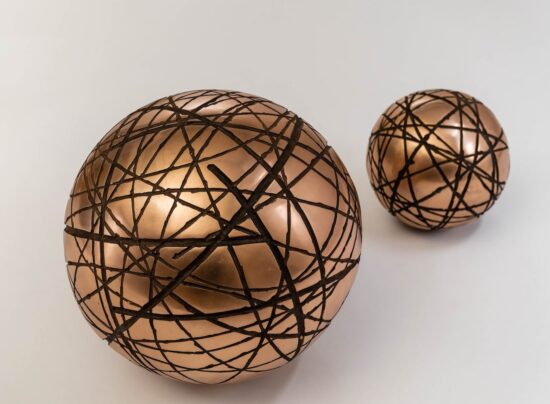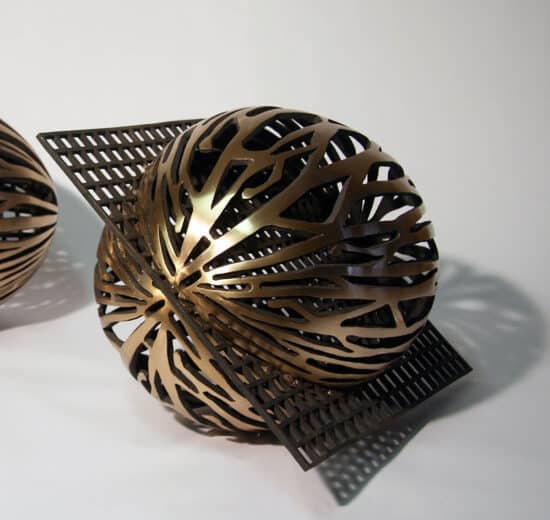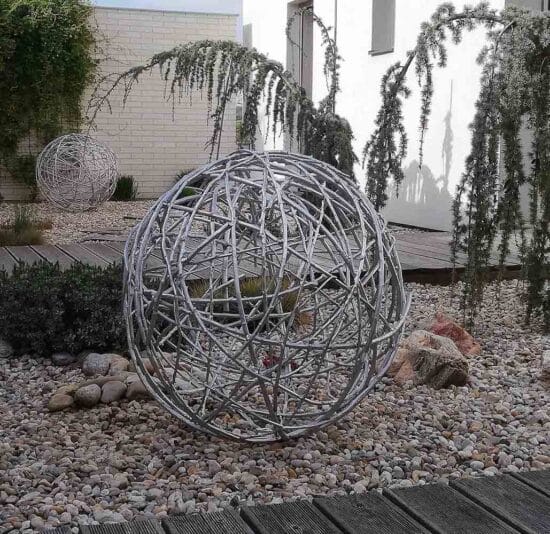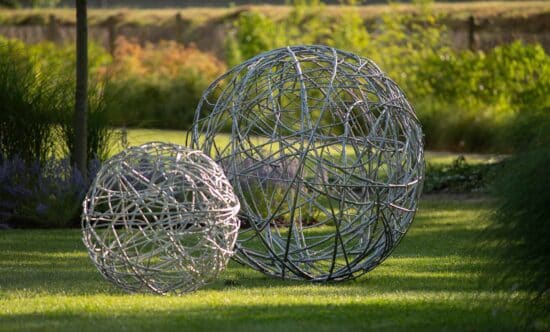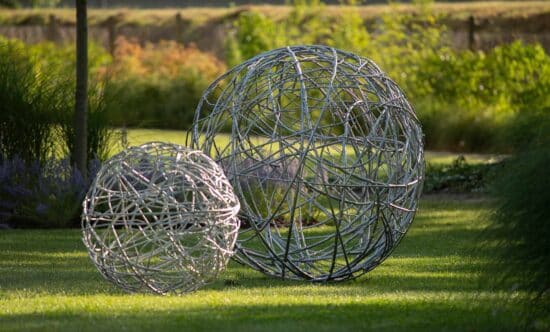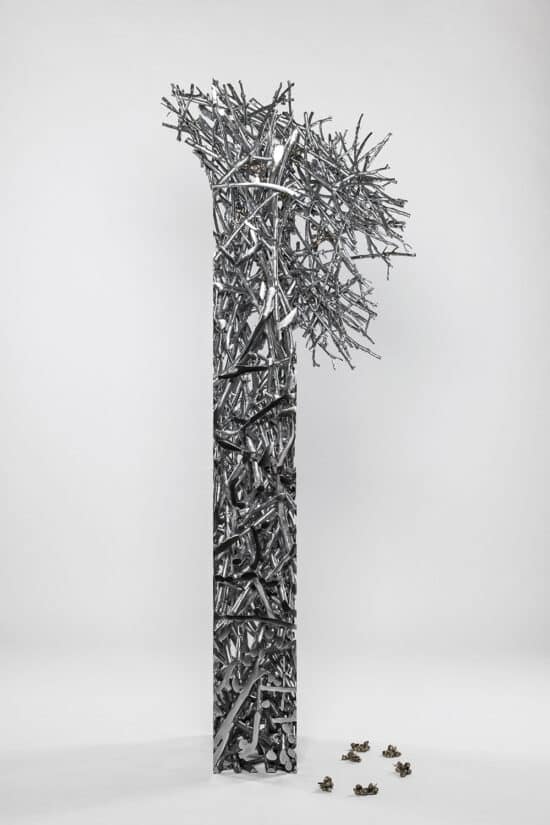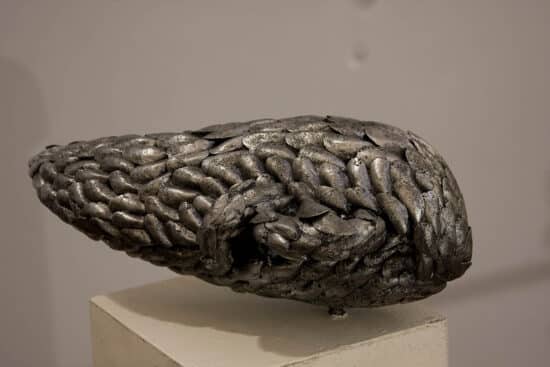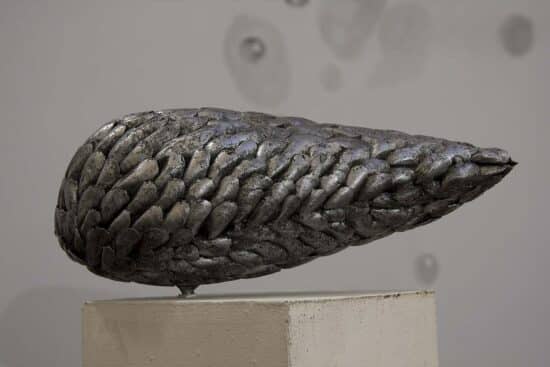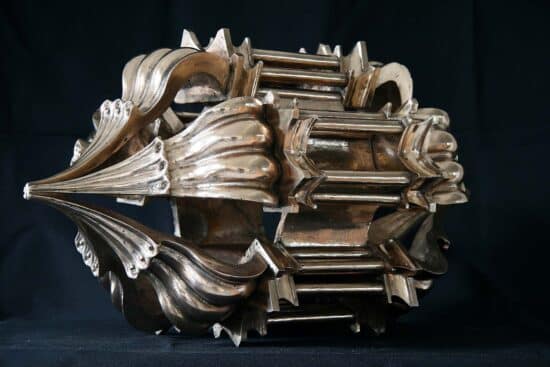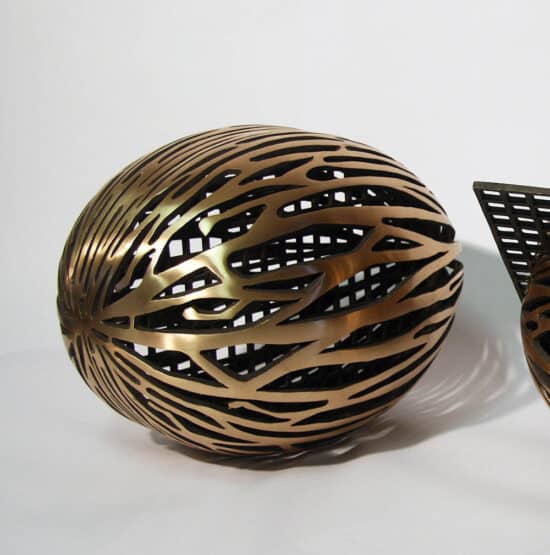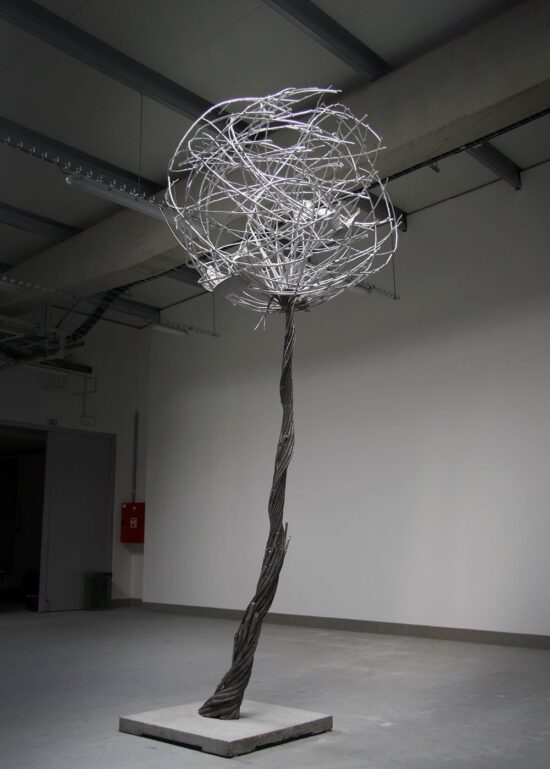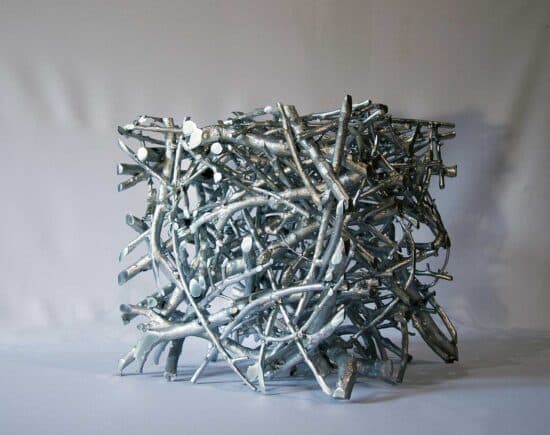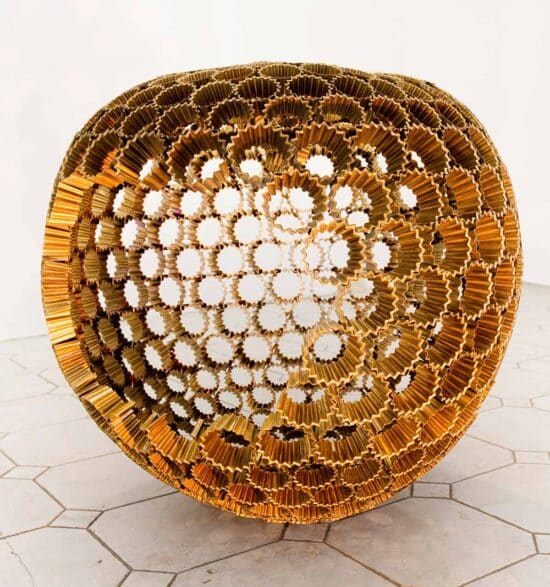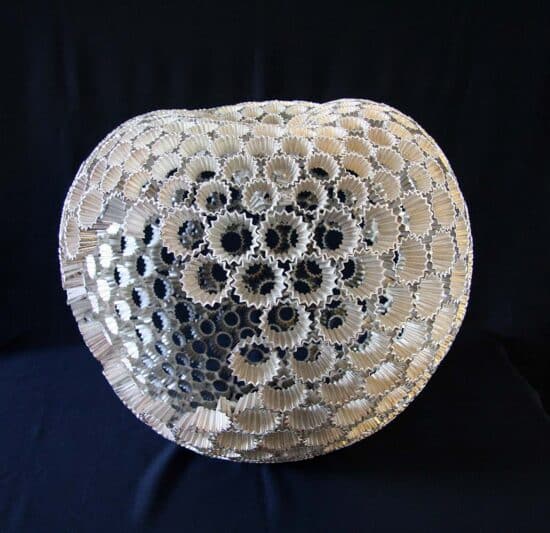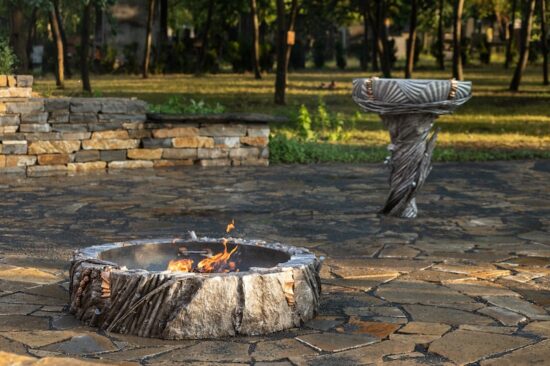Others
Biography
Ondřej Oliva (1982) is a Czech sculptor working with aluminium and bronze. To create his contemporary sculptures, he draws the inspiration from the things around him, his personal experiences and his travels: the artist reinterprets natural elements or commonplace objects using particularly the contrast between natural or organic forms and symmetrical or industrial elements.
The early days of sculpting
Ondřej Oliva (1982) is a contemporary sculptor who lives and works in the Czech Republic. He began his apprenticeship in sculpture in the late 1990s and later studied with artist Jaroslav Róna at the Academy of Fine Arts in Prague, graduating in 2010. Art is no stranger to his family: his father, Otmar Oliva, is an internationally renowned artist best known for his work in sacred art. The support and high standards of his father in Ondřej’s artistic training are very important to him. The motivation, energy and effort that Otmar puts into his work is the example he grew up with and which has inspired him since childhood.
“The most important quality a sculptor should have, in my opinion, is diligence. […] From the time I was six years old, I spent all my summer days in my father’s workshop and today I can spend twelve to fifteen hours a day there. Endurance is another important characteristic, as sculpting is a marathon, not a sprint. The last qualities for me are introspection and humility. I know I should mention talent too, but it is given to us and if we don’t develop it ourselves, through our own efforts, and if we don’t work on it, it will be useless to us anyway.” Ondřej Oliva
Ondřej Oliva: nature inscribed in permanence
The choice of material is important for the artist who chooses bronze or aluminium to give his works a long-term perspective. He says: “If I invest so much effort, work, time and energy in creating a sculpture, the result must be final and permanent. […] I think each metal radiates a specific energy and speaks its own language. From the design phase of the work, I already know what material I will use for the final sculpture.” The process of creation linked to the use of these metals is very long and laborious: the production of a sculpture from start to finish thus takes several months.
Ondřej Oliva’s aim is to create visually interesting sculptures whose form and content are accessible to everyone, and for this reason he chooses objects that are present in our everyday lives. “The inspiration for my work is all around me, you just have to keep your eyes open and be aware of the stimuli around you. I like to travel and I always bring natural elements or objects that have captured my attention back from my travels.”
Nature is indeed a very important source of inspiration for the artist. In particular, he attributes great symbolic value to trees. His dissertation on Gastronomy and the Aesthetics of Food, as well as his three-year experience as a chef in a luxury restaurant in the United States, have also greatly inspired him: the subjects of his contemporary sculptures include nuts, apples and molluscs, reinterpreted through the artist’s eye and imbued with multiple references and allusions. Ondřej Oliva particularly likes to use the contrast between natural and organic forms and symmetrical or industrial elements in his work.
Exhibitions, collections and public works
Since the 2010s, Ondřej Oliva has exhibited in galleries and institutions in the Czech Republic and Europe, including the MAXXI Museum of Contemporary Art in Rome (Italy, 2015). His works are part of private and public collections such as the National Gallery and the Museum of Young Art (ARTBANKA) in Prague. The artist has also been selected to create public monuments and monumental works: the “Meeting Place” fountain for the town of Uherský Brod (Czech Republic, 2015), the four-metre “Tree of Knowledge” in Modrá (Czech Republic, 2016) and the tombstone of the famous footballer Josef Masopust in Vyšehrad Cemetery (Czech Republic, 2017).
CV
Education
- 2005 – 2010 – Academy of Fine Arts in Prague studio Sculpture I. Jaroslav Róna
- 2004 – 2006 – University Palacky, Olomouc
- 2002 – 2004 – Sculpture – Ak.sculptur R. Hanke, Zlínská private higher vocational school of art
- 1998 – 2002 – Stone Sculptoring – Ak. Sculptor Z. Tománek, Secondary school of aplied art. Uh. Hradiště
Exhibitions
- SOLO EXHIBITIONS:
- 2019 – URBAN SPACE, Galerie výtvarného umění v Náchodě, Náchod, (Czech Republic)
- 2018 – INSTANT LIFE, Kotelna gallery, Říčany u Prahy, (with T. Tichý), (Czech Republic)
- 2015 – MALINA X OLIVA, Orlovna gallery, Kroměříž, (with M. Malina), (Czech Republic)
- 2015 – (AN)ORGANIC, Beseda gallery, Ostrava, (Czech Republic)
- 2015 – (AN)ORGANIC CODES, Kotelna gallery, Říčany u Prahy, (with T. Tichý), (Czech Republic)
- 2013 – OBJECTS, Panský dům gallery, Uherský Brod, (Czech Republic)
- 2013 – Tomáš Tichý/The Theater, guest Ondřej Oliva, Chemistry gallery, Prague, (Czech Republic)
- 2012 – DEGUSTATION, Primavesy gallery, Olomouc, (Czech Republic)
- 2012 – Ondřej Oliva – objects, Agustinian house, Luhačovice, (Czech Republic)
- 2012 – Ondřej Oliva/objects, Tomáš Tichý/ paintings, Minsk, Belarus, (with T. Tichý)
- 2012 – Ondřej Oliva, ProArt Fest, Prónay castle, Alsópetény, (Hungary)
- 2011 – Ondřej Oliva/objects, Tomáš Tichý/paintings, Hydroelectric power station Semily, (with T. Tichý), (Czech Republic)
- 2011 – GOURMET, Art-pro gallery, Prague, (Czech Republic)
- 2010 – ROBONDRA, Trafo gallery, Prague, (with R. Paluch), (Czech Republic)
- 2009 – oLLa, Vyšehrad gallery, Prague, (with J. Lauterkranc), (Czech Republic)
- GROUP EXHIBITIONS:
- 2021 – ART IN THE CITY, Golden Bridge, České Budějovice, (Czech Republic)
- 2019 – VELVET EDITION, pop-up exhibition, Palmovka, Prague, (Czech Republic)
- 2019 – VELVET EDITION, pop-up exhibition, Palmovka, Prague, (Czech Republic)
- 2019 – KRAJINOW, Muzeum of art and design, Benešov, (Czech Republic)
- 2019 – ART IN THE CITY, Alšova jihočeská galerie, Hluboká nad Vltavou, (Czech Republic)
- 2018 – CAN`T STOP KISSING YOU, Chemistry Gallery, Prague, (Czech Republic)
- 2018 – VACLAVART, Wenceslas Square, Prague, (Czech Republic)
- 2018 – ART SAFARI, studio Bubec, Prague, (Czech Republic)
- 2018 – ART IN THE CITY, castle Mitrowicz, Týn nad Vltavou, (Czech Republic)
- 2017 – PASSION, Chemistry Gallery, Prague, (Czech Republic)
- 2017 – SCULPTURE LINE, Prague, (Czech Republic)
- 2017 – ART SAFARI, studio Bubec, Prague, (Czech Republic)
- 2017 – THE SCULPTURE GARDEN, The Odney Club, Cookham, England, (Czech Republic)
- 2016 – Art autumn of Bzenec XII., International exhibition of conterporary art, (Czech Republic)
- 2016 – UNIVERSERUM, Piazzeta Národní Divadlo, Prague, (Czech Republic)
- 2015 – Potato salad, Mariánská Gallery, České Budějovice, (Czech Republic)
- 2015 – MASA, Chemistry Gallery, Prague, (Czech Republic)
- 2015 – What I eat here and so I drink, Caesar Gallery, Olomouc, (Czech Republic)
- 2015 – ET CETERA, MAXXI Museo nazionale delle arti del XXI secolo, Roma, (Italy)
- 2015 – ARTPRAGUE, Kafka house, Prague, (Czech Republic)
- 2014 – The Demolition, Inpost area, Uherské Hradiště, (Czech Republic)
- 2014 – OSTRALE, Dresden, Germany, (Czech Republic)
- 2014 – Meat object, 4D gallery, Pisztory palace, Bratislava, (Slovakia)
- 2014 – Le truc, Gallery at the White deer, Uherské Hradiště, (Czech Republic)
- 2014 – Dark depths of the luck, Orlovna gallery, Kroměříž, (Czech Republic)
- 2013 – Forum Young Art Czech Republic – Bavaria 2013, Gallery of the city of Regensburg, (Germany)
- 2013 – 7 years old temple of liberty, Trafo Gallery, Prague, (Czech Republic)
- 2013 – Meat object, 4D Gallery, Galanta, (Slovakia)
- 2013 – ET CETERA, Italian Culture Institute in Prague, Prague, (Czech Republic)
- 2013 – Statue and Objects XVIII., Bratislava, (Slovakia)
- 2013 – Forum Young Art Czech Republic – Bavaria 2013, Gallery of the city of Pilsen, Pilsen, (Czech Republic)
- 2013 – Dark depths of the luck, Novoměstská radnice gallery, Prague, (Czech Republic)
- 2012 – Original perspectives, Galery At the White Unicorn, Klatovy, (Czech Republic)
- 2012 – Zlín Youth Salon 2012, House of Art, Zlín, (Czech Republic)
- 2012 – ARTPRAGUE, Mánes gallery, Prague, (Czech Republic)
- 2011 – higgledy-piggledy, Trafo gallery, Prague, (Czech Republic)
- 2011 – Sculptors school of Jaroslav Róna, Malostranská beseda gallery, Prague, (Czech Republic)
- 2011 – Original & Perspektive, Bohemia modern art gallery, Prague, (Czech Republic)
Articles
Sculpture – Ondřej Oliva: water and fire
Two sculptures by Ondřej Oliva are at the heart of a project entitled “The Forest of Memories”, a new space at the Neredin Cemetery in Olomouc...
Sculpture: an interview with Ondřej Oliva
Ondřej Oliva (1982) is a Czech sculptor working with aluminium and bronze. He draws the inspiration from the things around him, his personal...




